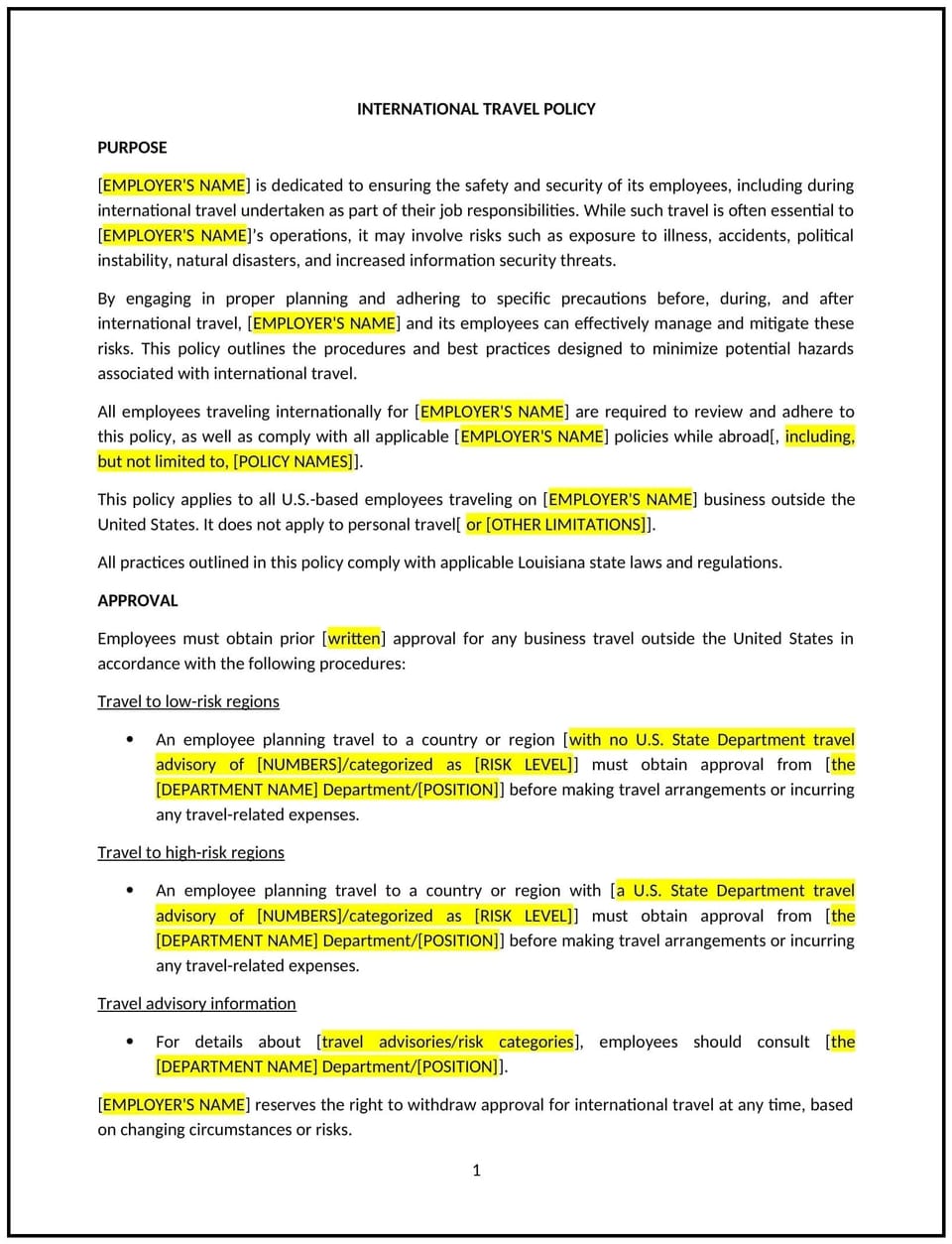International travel policy (Louisiana): Free template

International travel policy (Louisiana)
This international travel policy is designed to help Louisiana businesses establish guidelines for employees traveling abroad for work. It outlines procedures for planning, approval, expense management, and safety to ensure efficiency and preparedness.
By implementing this policy, businesses can manage travel costs effectively, promote safety, and streamline international business operations.
How to use this international travel policy (Louisiana)
- Define scope: Specify the types of travel covered by the policy, such as client meetings, conferences, or training sessions abroad.
- Establish approval processes: Detail the steps for requesting and obtaining approval for international travel, including necessary documentation.
- Outline expense guidelines: Provide rules for reimbursable expenses, such as airfare, accommodations, meals, and transportation.
- Include safety protocols: Detail measures for ensuring traveler safety, such as required travel insurance and emergency contact procedures.
- Address travel documentation: Specify requirements for passports, visas, vaccinations, and other travel-related documents.
- Communicate reporting expectations: Clarify the need for trip reports or expense documentation upon return.
Benefits of using an international travel policy (Louisiana)
Implementing this policy provides several advantages for Louisiana businesses:
- Enhances safety: Helps employees prepare for potential risks associated with international travel.
- Manages costs: Sets clear expectations for travel-related expenses to control spending.
- Streamlines approvals: Establishes a consistent process for planning and authorizing trips.
- Promotes accountability: Ensures proper documentation and reporting of travel activities and expenses.
- Reflects Louisiana-specific needs: Aligns with local business practices while accommodating global travel requirements.
Tips for using this international travel policy (Louisiana)
- Plan ahead: Encourage employees to submit travel requests well in advance to allow for proper planning and approvals.
- Provide pre-travel briefings: Offer resources or training on destination-specific cultural and safety considerations.
- Use travel management tools: Implement software to streamline bookings, approvals, and expense tracking.
- Maintain emergency plans: Ensure employees know how to access assistance during emergencies while traveling.
- Update regularly: Revise the policy as needed to address changes in travel practices or global conditions.
Q: What types of expenses are covered under this policy?
A: Covered expenses typically include airfare, lodging, meals, local transportation, and incidental expenses necessary for business travel.
Q: How can employees request approval for international travel?
A: Employees should submit a travel request form outlining the purpose, itinerary, and estimated costs for management review and approval.
Q: What safety measures should employees follow while traveling internationally?
A: Employees should adhere to safety guidelines, such as registering with local embassies, maintaining contact with the office, and carrying emergency contact information.
Q: Are vaccinations or other health precautions required for international travel?
A: Yes, employees may need vaccinations or health clearances based on the destination’s requirements and travel advisories.
Q: What documentation is required for reimbursement of travel expenses?
A: Employees must provide receipts, invoices, and any other relevant documentation to support expense claims.
Q: How often should this policy be reviewed?
A: The policy should be reviewed annually or when global travel conditions or company practices change significantly.
Q: What should employees do if an emergency occurs during international travel?
A: Employees should contact their designated company representative or travel assistance provider immediately for support and guidance.
This article contains general legal information and does not contain legal advice. Cobrief is not a law firm or a substitute for an attorney or law firm. The law is complex and changes often. For legal advice, please ask a lawyer.


